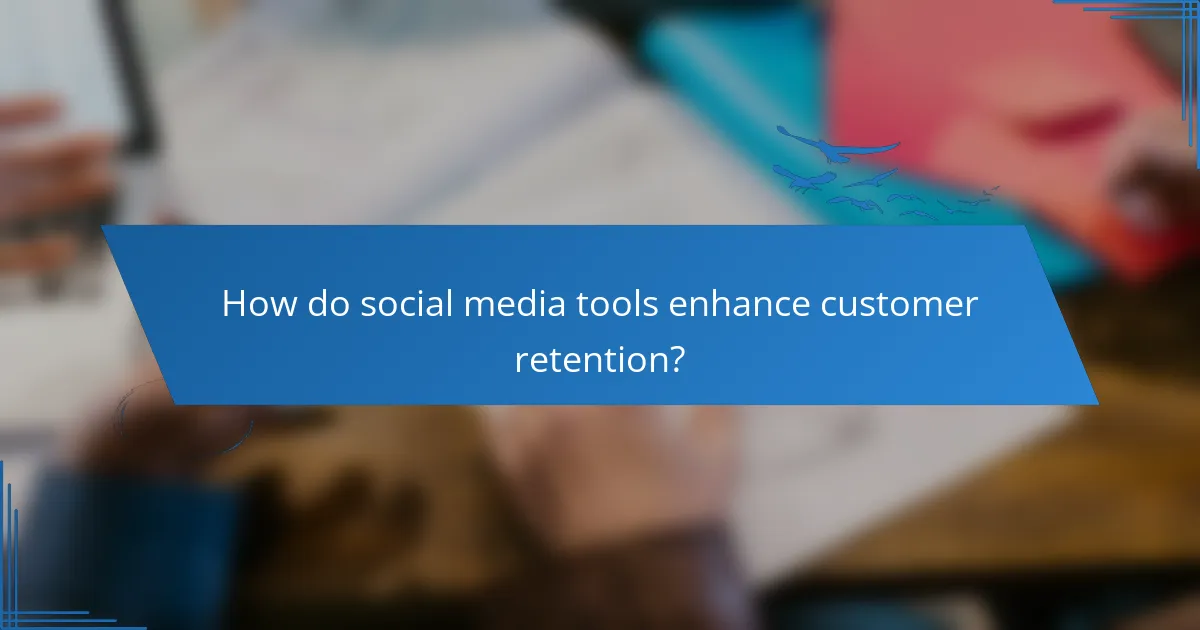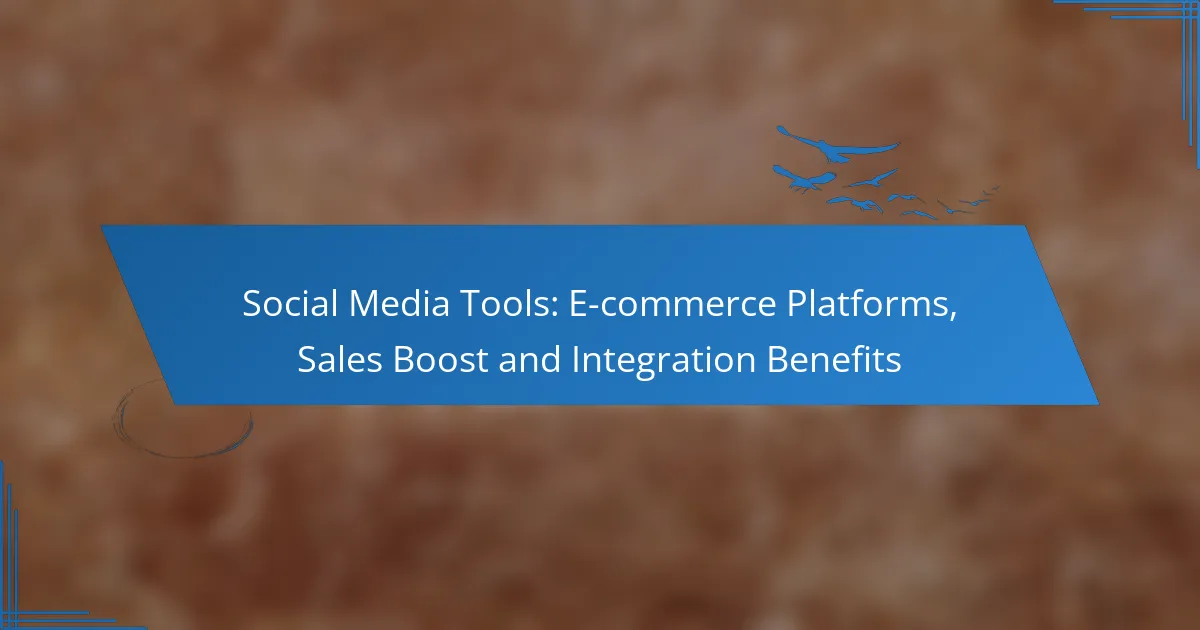Social media tools play a crucial role in enhancing e-commerce sales by enabling direct customer interactions and targeted marketing strategies. By integrating these platforms, businesses can increase their visibility, drive traffic to their online stores, and streamline sales processes, ultimately leading to higher revenue. The synergy between social media and e-commerce not only improves customer engagement but also facilitates seamless transactions, making it an essential strategy for modern retailers.

How can social media tools boost e-commerce sales in the UK?
Social media tools can significantly enhance e-commerce sales in the UK by facilitating direct interaction with customers and providing targeted marketing opportunities. By leveraging these platforms, businesses can increase visibility, drive traffic to their online stores, and ultimately boost sales.
Increased customer engagement
Social media platforms foster a dynamic environment for customer engagement, allowing brands to interact directly with their audience. Regular posts, stories, and live sessions can create a sense of community, encouraging customers to share their experiences and feedback.
Engagement can be further enhanced through user-generated content, where customers share their own photos or reviews of products. This not only builds trust but also encourages potential buyers to make purchases based on authentic experiences.
Targeted advertising capabilities
Social media tools offer advanced targeting options that allow e-commerce businesses to reach specific demographics effectively. Advertisers can segment audiences based on interests, behaviors, and location, ensuring that marketing efforts are directed toward those most likely to convert.
For instance, a UK-based fashion retailer can target ads to users who have shown interest in similar brands or products, increasing the likelihood of engagement and sales. Utilizing tools like Facebook Ads or Instagram Shopping can streamline this process and maximize return on investment.
Enhanced customer insights
Utilizing social media tools provides e-commerce businesses with valuable insights into customer preferences and behaviors. Analytics features allow brands to track engagement metrics, such as likes, shares, and comments, helping them understand what resonates with their audience.
These insights can inform product development, marketing strategies, and customer service improvements. For example, if a particular product garners significant attention, businesses can consider increasing inventory or launching similar items to capitalize on the interest.

What are the top social media tools for e-commerce integration?
The leading social media tools for e-commerce integration include platforms that facilitate seamless connections between online stores and social networks. These tools enhance sales by allowing businesses to market products directly on social media, streamline transactions, and improve customer engagement.
Shopify
Shopify is a popular e-commerce platform that offers robust social media integration features. It allows merchants to sell directly on platforms like Facebook and Instagram, enabling a streamlined shopping experience for customers. With Shopify, businesses can create shoppable posts and ads, making it easier to convert social media traffic into sales.
When using Shopify, consider its user-friendly interface and extensive app marketplace, which provides additional functionalities for marketing and sales. However, be mindful of transaction fees that may apply depending on your payment gateway.
WooCommerce
WooCommerce is a flexible e-commerce solution built on WordPress, offering various social media integration options. It allows users to connect their online stores with platforms like Facebook and Pinterest, enabling product tagging and advertising directly from social channels. This can significantly enhance visibility and drive traffic to your site.
To maximize WooCommerce’s potential, ensure your website is optimized for mobile users, as a significant portion of social media traffic comes from mobile devices. Additionally, consider using plugins that enhance social sharing capabilities to further boost engagement.
BigCommerce
BigCommerce is another powerful e-commerce platform that supports social media integration, allowing businesses to sell on channels like Facebook and Instagram. Its built-in features make it easy to create shoppable posts and manage inventory across platforms, which can lead to increased sales opportunities.
When choosing BigCommerce, take advantage of its comprehensive analytics tools to track the performance of your social media sales. Keep in mind that while BigCommerce offers a range of features, it may be more suitable for medium to large businesses due to its pricing structure and scalability options.

What are the benefits of integrating social media with e-commerce platforms?
Integrating social media with e-commerce platforms offers significant advantages, including enhanced customer engagement and streamlined sales processes. This synergy allows businesses to leverage social channels for direct sales, improving overall efficiency and visibility.
Streamlined customer experience
Integrating social media with e-commerce creates a seamless shopping journey for customers. Users can discover products through social feeds, view detailed descriptions, and make purchases without leaving the platform. This convenience can lead to higher conversion rates and reduced cart abandonment.
To optimize the customer experience, ensure that your social media profiles link directly to product pages. Utilize features like shoppable posts on platforms such as Instagram and Facebook, which allow users to buy products directly from their feeds.
Improved brand visibility
Social media integration enhances brand visibility by allowing businesses to reach a wider audience. Engaging content shared on social platforms can attract potential customers who may not have discovered the brand otherwise. Regularly posting updates, promotions, and user-generated content can further boost brand awareness.
Consider using targeted ads on social media to promote your e-commerce offerings. These ads can be tailored to specific demographics, increasing the likelihood of reaching interested customers and driving traffic to your online store.
Data-driven marketing strategies
Integrating social media with e-commerce provides valuable data that can inform marketing strategies. Businesses can analyze customer interactions, preferences, and purchasing behaviors to tailor their offerings and campaigns effectively. This data-driven approach can lead to more personalized marketing efforts and improved ROI.
Utilize analytics tools available on social media platforms to track engagement and conversion metrics. Regularly review this data to adjust your marketing strategies, focusing on what resonates most with your audience for optimal results.

How do social media tools enhance customer retention?
Social media tools significantly enhance customer retention by fostering engagement and building relationships with customers. By utilizing targeted strategies, businesses can create a loyal customer base that feels valued and connected to the brand.
Personalized marketing campaigns
Personalized marketing campaigns leverage customer data to tailor messages and offers to individual preferences. This approach increases the likelihood of customer engagement, as consumers are more likely to respond to content that resonates with their interests.
For effective personalization, businesses should analyze customer behavior on social media platforms and segment their audience accordingly. Utilizing tools that track user interactions can help identify trends and preferences, allowing for targeted promotions that drive repeat purchases.
Loyalty programs integration
Integrating loyalty programs with social media tools enhances customer retention by rewarding repeat purchases and encouraging ongoing engagement. These programs can be promoted through social channels, making it easy for customers to join and participate.
To maximize the effectiveness of loyalty programs, businesses should ensure that rewards are appealing and easily accessible. For instance, offering exclusive discounts or early access to new products can motivate customers to remain loyal. Regularly communicating program benefits on social media can keep customers informed and engaged.

What criteria should be considered when selecting social media tools for e-commerce?
When selecting social media tools for e-commerce, consider factors such as ease of use, integration capabilities, and cost-effectiveness. These criteria will help ensure that the tools you choose enhance your online sales efforts and streamline your operations.
Ease of use
Ease of use is crucial when selecting social media tools for e-commerce. A user-friendly interface allows you to quickly navigate the platform, reducing the learning curve and enabling you to focus on sales rather than technical issues.
Look for tools that offer intuitive dashboards and straightforward setup processes. For example, platforms with drag-and-drop features or guided tutorials can significantly enhance your experience.
Integration capabilities
Integration capabilities determine how well a social media tool connects with your existing e-commerce systems. Tools that seamlessly integrate with your online store, payment processors, and inventory management systems can save time and reduce errors.
Check for compatibility with popular e-commerce platforms like Shopify, WooCommerce, or Magento. A tool that offers API access or pre-built integrations can streamline your workflow and improve data accuracy.
Cost-effectiveness
Cost-effectiveness is a key consideration when choosing social media tools for e-commerce. Evaluate the pricing models of different tools, including monthly subscriptions, transaction fees, or tiered pricing based on usage.
Consider your budget and the potential return on investment. Tools that provide a free trial or a basic free version can help you assess their value before committing to a paid plan. Aim for solutions that offer essential features without unnecessary costs.

What emerging trends in social media tools are shaping e-commerce?
Emerging trends in social media tools are significantly influencing e-commerce by enhancing customer engagement and streamlining sales processes. Features like shoppable posts, live streaming, and integrated payment options are making it easier for businesses to connect with consumers directly on platforms they already use.
Shoppable Posts and Stories
Shoppable posts and stories allow brands to tag products directly in their social media content, enabling users to purchase items without leaving the platform. This seamless integration reduces friction in the buying process and can lead to higher conversion rates.
For example, Instagram and Facebook have implemented features that allow users to click on product tags to view prices and make purchases instantly. Businesses should consider utilizing these features to capitalize on impulse buying behaviors.
Live Streaming Sales
Live streaming sales are becoming a popular way for brands to showcase products in real-time while interacting with potential customers. This trend combines entertainment with commerce, creating a dynamic shopping experience that can drive sales.
Platforms like TikTok and Instagram offer live shopping features where viewers can ask questions and make purchases during the stream. Brands should prepare engaging content and consider scheduling regular live events to build a loyal customer base.
Integrated Payment Solutions
Integrated payment solutions within social media platforms simplify transactions by allowing users to complete purchases without redirecting to external websites. This trend enhances user experience and can lead to increased sales.
For instance, Facebook and Instagram have introduced checkout features that support various payment methods, including credit cards and digital wallets. Businesses should ensure they are set up to accept these payments to streamline the purchasing process for their customers.
Influencer Collaborations
Collaborating with influencers remains a powerful trend in social media e-commerce, as influencers can effectively reach and engage target audiences. These partnerships can enhance brand visibility and credibility.
Brands should identify influencers whose values align with their own and consider offering affiliate programs or exclusive discounts to incentivize promotion. This strategy can lead to increased traffic and sales through authentic recommendations.
